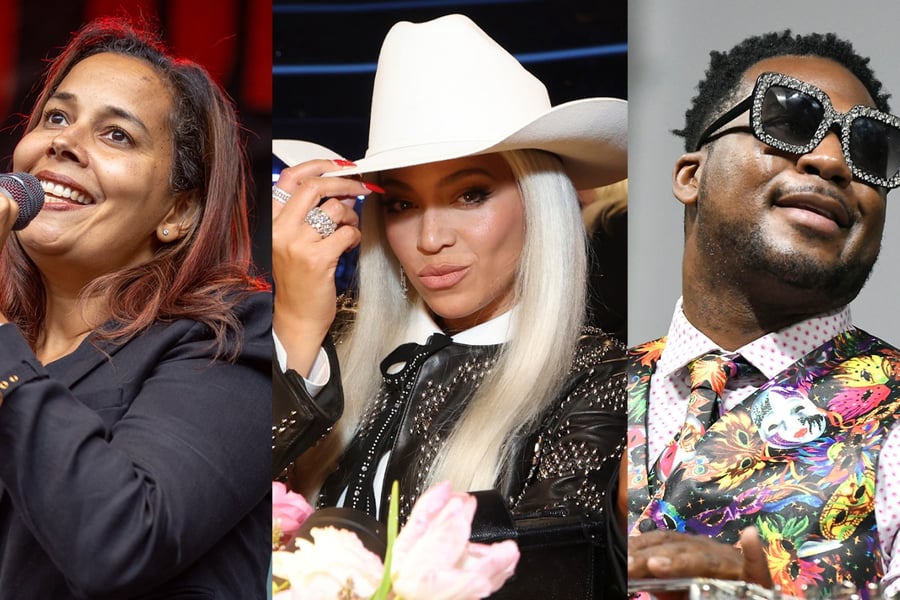Robert Randolph was tooling around Florida when the call came. The musician, whose sacred steel slide guitar has powered his own Family Band albums and has popped up on records by Elton John, Ozzy Osbourne, Rob Thomas, Santana, and Dave Matthews Band, was behind the wheel when his office phoned to tell him that Beyoncé wanted him to record with her.
“I said, ‘Record what — you sure you have the right person?’” Randolph recalls, noting his own jam-band style. “I’m the kind who plays and plays and plays on. It was kind of surreal.”
Shortly after her commercial for Verizon aired during Sunday night’s Super Bowl, Beyoncé dropped two songs from Act II, the second installment of her three-part Renaissance project. Details of the album, due March 29, are still emerging, but it’s widely believed to focus on country music. Rhiannon Giddens, the Americana singer and multi-instrumentalist, called it Beyoncé’s “new country record” on Facebook on Monday (on Twitter, she said it was “country-inspired”) and announced her participation, citing “my banjo and viola playing” on one of the new songs, “Texas Hold ‘Em.” “The beginning is a solo riff on my minstrel banjo,” she wrote. Other participants include pedal steel player Justin Schipper, who plays with Randolph on “16 Carriages.”
When Randolph arrived in L.A. a few months ago, he found himself in a room with Giddens, producer and instrumentalist Raphael Saadiq (playing drums and bass), and keyboardist Khirye Tyler. Beyoncé was there too.
“When we did the first session, I was like, ‘What are we doing?’” Randolph says. “Raphael said, ‘Here’s what Beyoncé has in her head. And you were hand-picked because you’re the only guy who could do this.’ Beyoncé already had an idea of what she wanted to do. She wanted to do something with some playing, with some country fire. She said she liked the way I make my instrument sound like a singer.”
In a decidedly small-scale setting, especially for Beyoncé, the musicians gathered and started playing together, tossing around musical ideas in the process. “We were cutting,” Randolph says. “We were getting down. It was, ‘Let’s try this,’ then doing one or two takes. And she sang with us, man. She sang it right there. You just follow her lead and go.”
Beyoncé’s longtime connection to country music — which has manifested itself in songs like “Daddy Lessons” from Lemonade, in her fashion, and even at the 2004 Houston Livestock Show and Rodeo where she arrived on horseback — is a natural one. But Randolph says it’s satisfying to see the Texas native lean into it.
Love Music?
Get your daily dose of everything happening in Australian/New Zealand music and globally.
“It’s great for her to go this route,” he says. “In country music for a longest time, it almost seemed like it was supposed to be out of left field when a Black artist says, ‘Hey, I’m going to do a country record.’ It’s crazy that the whole world doesn’t understand the history of country music and fiddles, dobros and banjos. Where do you think that stuff came from? Who was living in the barn? Who were the people living in the back houses?”
After the session, Randolph headed home to New Jersey. He also wrapped up his next album with producer Shooter Jennings behind the boards. Randolph calls the record “a rock & roll album” — which became apparent when the studio receptionist in L.A., where they were recording, called to say there were noise complaints from upstairs.
“We said, ‘Who’s upstairs?’” Randolph recalls. “And they’re like, ‘T Bone Burnett and Robbie Robertson. They’re complaining that the bass amp y’all put in the hallway is too loud.’ Robbie comes into the studio and said, ‘Oh, that’s you down here? You guys are getting funky in here.’” Randolph says he played one track for Robertson, who asked about their creative process. “I said, ‘Man, we just started jamming and that’s what you’re listening to,’” Randolph says. “And he’s like, ‘So you just wrote the songs off a jam? Wow.’”
In the meantime, Randolph heard he may be drafted for more Beyoncé work. “We’re waiting for the call,” he says. “She wants to record some more songs.”
At that exact moment while talking to RS, Randolph received a text from Saadiq: “Hey, you’re coming back to L.A.,” Randolph says, reading off his phone. “So we’re going back in,” he adds. “As they say in church, we’ll see what the end is going to be.”
From Rolling Stone US



































